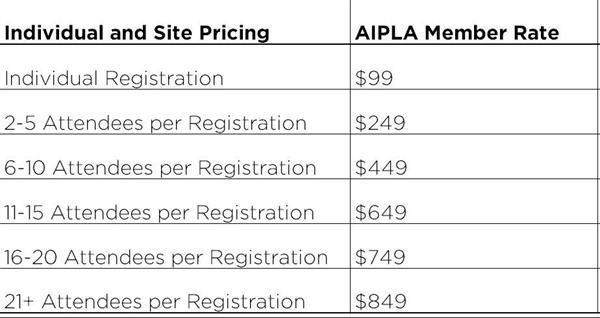Continuing Legal Education (CLE)
AIPLA CLE Webinar: Presenting and Defending a Patent Appeal-Best Practices Before the Federal Circuit
December 15, 2020 12:30 PM to 2:00 PM
Credits
1.5 CLE Credits Available
Registration
Presented by: Farheena Rasheed of United States Patent & Trademark Office; William Jenks of Jenks IP Law; and Christy Lea of Knobbe Martens
This event is free to AIPLA members who are not requesting CLE. Standard webinar pricing applies to those requesting CLE. CLE is included for our All Access Pass holders and Corporate Subscribers.
Pricing below only applies to those requesting CLE

In response to Covid-19, AIPLA has put in-place a new process for Multiple Attendee Site registrations that allows each site registrant to participate in the webinar independently.
Special rate for AIPLA SOLO PRACTICE/SMALL FIRM MEMBERS: $65
Special rate for AIPLA STUDENT MEMBERS: $10
Registration includes:
- For multiple-attendee sites, each registered participant will receive individual logins due to Covid-19 social distancing requirements.
- CLE certification/processing for applicable states. Reference CLE Information below for complete details.
- Webinar materials, including complete CLE processing information, accessible 24-48 hours before webinar date.
Cancellation Policy:
To get full refund, registrant must request refund five (5) days prior to live event. If less than five (5) days, registrant is transferred to product.
System requirements:
Webinar access is compatible with any Windows 7 or later computer, Android OS devices, or Apple/iOS devices. Check system compatibility here.
Accessibility for hearing impaired:
AIPLA’s webinars are available and accessible to individuals who are hearing impaired. If anyone at your location would like to know more about accommodations, please contact cle@aipla.org. We ask that you let us know at least 7 business days out from the webinar, to ensure that we can identify and deploy the solution that best fits our registrants needs.
CLE INFORMATION
AIPLA is a pre-approved CLE provider with the following states:
- Alaska
- California
- New Hampshire
- New Mexico
- New York
- Pennsylvania
- Vermont
AIPLA has applied for CLE accreditation in the following states:
- Alabama
- Florida
- Illinois
- Indiana
- Minnesota
- Ohio
- Tennessee
- Texas
- Virginia
- Washington
CLE Restrictions:
ATTENTION attorneys in Louisiana, Ohio, Pennsylvania and Utah
These states mandate attorneys can only view a webinar independently at their own computer to receive CLE credit. Multiple attendees prohibited.
ATTENTION attorneys in Arizona
Arizona does not certify courses or providers. Arizona lawyers are required to independently review AZ's regulations and make their own determination that it qualifies for credit towards their MCLE requirements. MCLE Regulation 104(A) identifies the standards to apply. AIPLA will email an attendance affidavit to registrants requesting AZ CLE credit after the webinar.
ATTENTION attorneys in New Hampshire
New Hampshire attendees must self-determine whether a program is eligible for credit, and self-report their attendance according to NH Supreme Court Rule 53. The New Hampshire Minimum Continuing Legal Education (NHMCLE) Board does not approve or accredit CLE activities for the NH Minimum CLE requirement. AIPLA will email an attendance affidavit to registrants requesting NH CLE credit after the webinar.
Disclaimer: AIPLA is a nonprofit national bar association. The sole purpose of this CLE program is to provide educational and informational content. AIPLA does not provide legal services or advice. The opinions, views and other statements expressed by contributors to this CLE program are solely those of the contributors. These opinions, views and statements of the contributors do not necessarily represent those of AIPLA and should not be construed as such.
Add to:
News
-
 AIPLA Submits Comments to the India Department for Promotion of Industry and Internal Trade on the Designs Act Amendment
AIPLA Submits Comments to the India Department for Promotion of Industry and Internal Trade on the Designs Act Amendment
February 23, 2026
Arlington, VA. February 20, 2026 – The American Intellectual Property Law Association (AIPLA) submitted comments to the Department for Promotion of Industry and Internal Trade’s Concept Note on the proposed amendments to India’s Designs Act, 2000 (“Designs Act”). -
 AIPLA Comments on the Draft Trademark Law of the People’s Republic of China
AIPLA Comments on the Draft Trademark Law of the People’s Republic of China
February 11, 2026
Arlington, VA. February 9, 2026 – The American Intellectual Property Law Association (AIPLA) submitted comments to the Legislative Affairs Commission of the Standing Committee of the National People’s Congress regarding the latest Draft Trademark Law of the People’s Republic of China. AIPLA recognized the NPC’s efforts to streamline trademark procedures, strengthen protection, and address abusive and bad-faith filing practices. -
 AIPLA Submits Comments to China’s Supreme People’s Court on Draft Patent Infringement Judicial Interpretations
AIPLA Submits Comments to China’s Supreme People’s Court on Draft Patent Infringement Judicial Interpretations
February 11, 2026
Arlington, VA. February 2, 2026 – The American Intellectual Property Law Association (AIPLA) submitted comments on the Supreme People’s Court of the People’s Republic of China’s Draft Judicial Interpretations concerning patent infringement disputes. AIPLA notes the SPC’s efforts to clarify and modernize patent litigation procedures but identified several provisions that would benefit from greater precision. -
 AIPLA Files Amicus Curiae Brief Re Case G 1/25 (Adaptation of the Description)
AIPLA Files Amicus Curiae Brief Re Case G 1/25 (Adaptation of the Description)
February 3, 2026
Arlington, VA. January 28, 2026 – The American Intellectual Property Law Association (AIPLA) filed amicus curiae observations in response to the invitation of the European Patent Office (EPO) Enlarged Board of Appeal in Case G 1/25, which addresses whether and to what extent a patent description must be adapted when claims are amended during opposition or opposition-appeal proceedings. -
 AIPLA Comments to the USPTO on the Proposed Rulemaking for Required Use by Foreign Applicants and Patent Owners of a Patent Practitioner
AIPLA Comments to the USPTO on the Proposed Rulemaking for Required Use by Foreign Applicants and Patent Owners of a Patent Practitioner
January 30, 2026
Arlington, VA. January 28, 2026 - The American Intellectual Property Law Association (AIPLA) submitted comments to the USPTO in response to the NPRM for “Required Use by Foreign Applicants and Patent Owners of a Patent Practitioner.”
